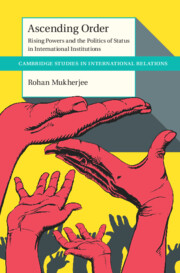Book contents
- Reviews
- Ascending Order
- Cambridge Studies in International Relations: 160
- Ascending Order
- Copyright page
- Dedication
- Epigraph
- Contents
- Figures
- Tables
- Acknowledgments
- Abbreviations
- 1 Introduction
- 2 Conceptual Foundations
- 3 Institutional Status Theory
- 4 The United States and the Atlantic System in the Nineteenth Century
- 5 Japan and the Washington System in the Interwar Period
- 6 India and the International Order of the Cold War
- 7 China and the Liberal International Order
- 8 Conclusion
- Appendix Case Selection
- Index
- Cambridge Studies in International Relations
2 - Conceptual Foundations
Published online by Cambridge University Press: 21 July 2022
- Reviews
- Ascending Order
- Cambridge Studies in International Relations: 160
- Ascending Order
- Copyright page
- Dedication
- Epigraph
- Contents
- Figures
- Tables
- Acknowledgments
- Abbreviations
- 1 Introduction
- 2 Conceptual Foundations
- 3 Institutional Status Theory
- 4 The United States and the Atlantic System in the Nineteenth Century
- 5 Japan and the Washington System in the Interwar Period
- 6 India and the International Order of the Cold War
- 7 China and the Liberal International Order
- 8 Conclusion
- Appendix Case Selection
- Index
- Cambridge Studies in International Relations
Summary
This chapter lays down the conceptual foundations of Institutional Status Theory. It situates IST in the literature on status in world politics, and on social identity in particular. It elaborates on the concept of status as an intrinsic value and as a role that entails symbolic equality with higher-status actors, as distinct from status as a set of valued attributes. It discusses the psychological and social foundations of IST, in particular its relationship to and difference from constructivist theory. Finally, the chapter theorizes the great-power club and international institutions as sites of status struggles.
Keywords
- Type
- Chapter
- Information
- Ascending OrderRising Powers and the Politics of Status in International Institutions, pp. 28 - 54Publisher: Cambridge University PressPrint publication year: 2022

